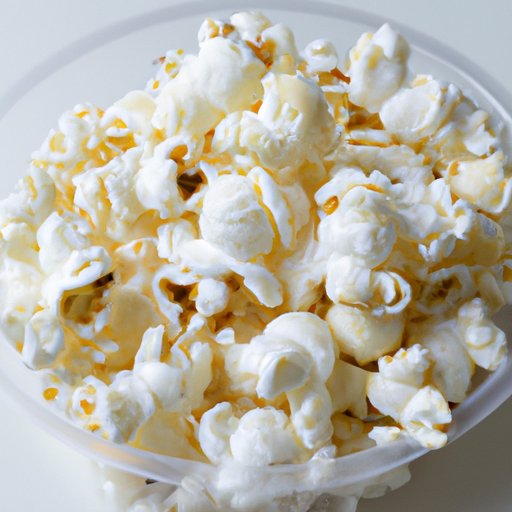Introduction
Popcorn is one of the most popular snacks in the world, enjoyed by people of all ages. It’s easy to make, inexpensive, and available almost everywhere. But is popcorn actually healthy? In this article, we’ll explore the nutritional benefits and potential health hazards of popcorn so you can decide for yourself whether it should be part of your diet.
Overview of Popcorn Nutrition
Popcorn is made from whole grains and is naturally low in fat and calories. One cup of air-popped popcorn contains just 31 calories and 0.4 grams of fat, making it an excellent choice for those trying to lose weight or maintain a healthy lifestyle. Popcorn is also a good source of fiber, providing about 1.2 grams per cup. Additionally, popcorn is high in complex carbohydrates, which provide slow-burning energy throughout the day.
Comparison of Popcorn Nutrition to Other Popular Snacks
To better understand how popcorn fits into a healthy diet, let’s compare its nutrient content to some other popular snacks. For example, a single-serve bag of potato chips contains around 150 calories and 10 grams of fat, while a 1-ounce serving of pretzels contains 110 calories and 1 gram of fat. In comparison, popcorn is much lower in calories and fat, making it a healthier option than these other snacks.
Exploring the Nutritional Benefits of Air-Popped Popcorn
Air-popped popcorn is the healthiest way to enjoy this snack. This method uses hot air to pop the kernels, resulting in a light and fluffy treat with no added fats or oils. Air-popped popcorn is rich in fiber, protein, and complex carbohydrates. It’s also a good source of several vitamins and minerals, including magnesium, phosphorus, zinc, and vitamins B6 and E.

Analyzing the Health Hazards of Eating Too Much Popcorn
Although popcorn is generally considered a healthy snack, it’s important to note that it does contain some potentially unhealthy ingredients. For example, many brands of popcorn are loaded with sodium, which can increase your risk of high blood pressure. Additionally, some brands of popcorn are high in calories and fat, especially if they’re flavored with butter or oil. Finally, popcorn can contain trace amounts of acrylamide, a chemical that has been linked to cancer.
Comparing Microwave and Store-Bought Popcorn for Health
When it comes to convenience, nothing beats microwave popcorn. However, it’s important to note that microwave popcorn often contains unhealthy ingredients, such as hydrogenated oils and artificial flavors. Additionally, some brands of microwave popcorn contain diacetyl, a chemical that has been linked to lung disease. On the other hand, store-bought popcorn is usually much healthier, as it’s made with natural ingredients and doesn’t contain any unhealthy additives.

Investigating the Role of Popcorn in a Healthy Diet
Popcorn can be part of a healthy diet, but it’s important to consume it in moderation. The American Heart Association recommends limiting your intake to two cups of popcorn per day. To make sure you’re getting the most nutritional benefit from your popcorn, opt for air-popped varieties and avoid those that are flavored with butter or oil. You can also add flavor to your popcorn with herbs, spices, or a sprinkle of Parmesan cheese.
Conclusion
In conclusion, popcorn can be a healthy snack when consumed in moderation. It’s low in calories, fat, and sodium, and it’s a good source of fiber, protein, and complex carbohydrates. However, it’s important to choose air-popped varieties and avoid those that are flavored with butter or oil. With a little bit of planning, popcorn can be an enjoyable and nutritious addition to your diet.
(Note: Is this article not meeting your expectations? Do you have knowledge or insights to share? Unlock new opportunities and expand your reach by joining our authors team. Click Registration to join us and share your expertise with our readers.)
